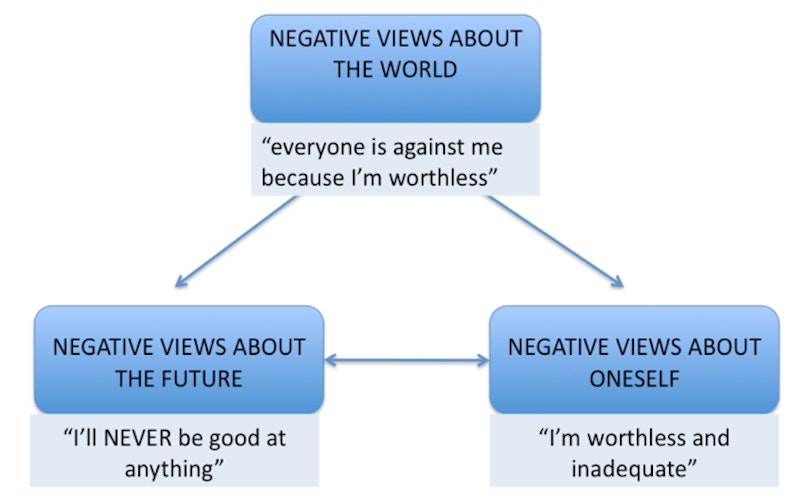Study Notes
Explaining Depression - Beck’s Cognitive Triad
- Level:
- AS, A-Level
- Board:
- AQA, Edexcel, OCR, IB
Last updated 22 Mar 2021
Beck developed a cognitive explanation of depression which has three components: a) cognitive bias; b) negative self-schemas; c) the negative triad.
a) Cognitive Bias
Beck found that depressed people are more likely to focus on the negative aspects of a situation, while ignoring the positives. They are prone to distorting and misinterpreting information, a process known as cognitive bias.
Beck detailed numerous cognitive biases, two of which include: over-generalisations and catastrophising. For example, a depressed person may make over-generalisations, where they make a sweeping conclusion based on a single incident, for example: ‘I’ve failed one end of unit test and therefore I’m going to fail ALL of my AS exams!’ Alternatively, a depressed person may experience catastrophising, where they exaggerate a minor setback and believe that it’s a complete disaster, for example: ‘I’ve failed one end of unit test and therefore I am never going to study at University or get a good job!’
b) Negative self-schemas
A schema is a ‘package’ of knowledge, which stores information and ideas about our self and the world around us. These schemas are developed during childhood and according to Beck, depressed people possess negative self-schemas, which may come from negative experiences, for example criticism, from parents, peers or even teachers.
A person with a negative self-schema is likely to interpret information about themselves in a negative way, which could lead to cognitive biases, such as those outlined above.
c) The negative triad
Beck claimed that cognitive biases and negative self-schemas maintain the negative triad, a negative and irrational view of ourselves, our future and the world around us. For sufferers of depression, these thoughts occur automatically and are symptomatic of depressed people.
The negative triad (pictured below) demonstrates these three components, including:
- The self – ‘nobody loves me.’
- The world – ‘the world is an unfair place.’
- The future – ‘I will always be a failure.’

You might also like
Depression
Study Notes
Obsessive Compulsive Disorder
Study Notes
Secondary Schools Offer Mental Health Training
17th January 2017
In Numbers: Mental Health in Children & Young People
17th January 2017
Behavioural Activation Can Reduce Negative Emotions
2nd February 2024
Why Do We Struggle With Executive Functioning?
9th February 2024
Psychedelic Drugs for Psychiatric Treatment?
23rd February 2024